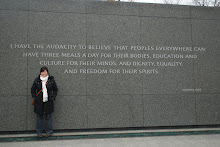 Ella Baker, from the "Americans who Tell the Truth" series
Ella Baker, from the "Americans who Tell the Truth" serieshttp://www.americanswhotellthetruth.org/pgs/portraits/Ella_Baker.php

Over the MLK weekend, I took part in a three-day study of the Sermon on the Mount through the Bartimaeus Institute. Ched Myers used the civil rights, Anabaptist, and Catholic Worker (anarchist) movements as modern day expressions of the non-violent ethic expressed in Matthew 5-7. One of the main themes of the weekend was the importance of being historically literate, and so Ched and Elaine spent a lot of time telling the stories of the people and events behind the three movements we discussed.
Men led these movements, for the most part, but it was encouraging to hear about several strong woman leaders. One of these leaders was Ella Baker (1903-1986). I hadn't even heard of Baker before the Institute. She was the granddaughter of a slave, and a behind-the-scenes organizer during the Civil Rights movement. Baker helped co-found the Southern Christian Leadership Conference, and was actually the one who first invited Dr. Martin Luther King, Jr. to the Conference. Dr. King (for good reason) gets much of the credit for the successes of the civil rights movement, but it was people like Ella who did much of the ground work that made his leadership possible. Ella Baker is a new role model for me.
I deeply resonated with Baker's example, and her leadership style. She was quoted as saying, "Strong people don’t need strong leaders," and critiqued the centralized leadership of many organizations of which she was a part. Her work supported ordinary people's democratic participation in the struggle for freedom.
In our day and age, specialists and outside experts are privileged as leaders. I want to be careful of this in my area of work. There are quite a few grassroots community gardens starting in under-served areas that are led by Spanish speakers. My co-worker and I are touted as local "experts," and asked to come show these people how to develop their gardens. I am definitely not an expert, but I don't often resist the title.
Ella Baker's legacy teaches a different way of leadership power - power broadly distributed. Part of me wants people to better remember this strong, black, sister leader, which is why I write this post. However, it may well be a lesson to organizers and leaders today that she is not well-recognized, and the broader civil rights movement that she strengthened continues as perhaps the greatest social movement of our day.



